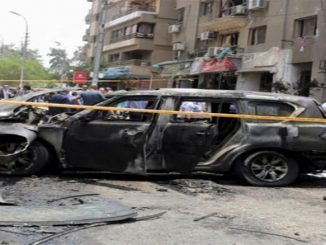
The Egyptian Batel (Void) campaign accused the Egyptian regime of negligence and called for providing quarantine places in every Egyptian governorate
The Batel campaign called on the Egyptian government to take a set of urgent measures to prevent the spread of the Corona virus in the country, most prominently “the formation of an emergency body in every governorate, including representatives from the Ministries of Health, Education, Environment, and Interior, and Supply and Internal Trade, to monitor the situation on a continuous basis, and submit reports periodically to the Cabinet directly. The campaign said in a statement that this emergency body should have the authority to take necessary preventive measures or treatment of infected cases in each governorate.
The campaign also called, in the statement it issued on Sunday and published on its account on Facebook, upon the media to “perform an educational role away from intimidation or spread of panic, relying only on medical facts and simple easy information that can reduce the chances of infection and spread of the disease.
is the campaign also called on all Islamic and Christian institutions to contribute to awareness of the public, and the moral responsibility of likely-infected people to enter a voluntary quarantine at home for two weeks, especially those coming from abroad to prevent the transmission of the disease to other citizens. The statement also said religious institutions, including imams in mosques and priests in churches, should increase ventilation in places of worship, and double the distance between rows of worshipers, and cancel all unnecessary religious events.
The campaign also called for “immediately closing schools, especially nurseries and primary schools in all governorates, and mandating the Ministry of Health to issue a daily statement like the rest of the world, on the number of infected cases, their whereabouts, and the number of deaths, God forbid.”
The Batel campaign statement referred to the comment of Dr. Mike Ryan, executive director of WHO’s emergencies program, when he was asked whether the virus may not spread as easily in Europe’s warm summer months, Dr. Ryan said: ‘We do not know yet what the activity or the behavior of this virus will be in different climatic conditions. We have to assume that the virus will continue to have the capacity to spread,’ adding: ‘It is a false hope to say yes it will just disappear in summer time, like influenza virus…There is no evidence right now to suggest that that will happen,’ as he put it.
Coronavirus spreading in Egypt
For days now, the Egyptian government has stated that a Taiwanese American woman was the origin of the coronavirus infections of 45 passengers and crew aboard a Nile cruise ship, suggesting that Egypt was a victim of the global spread of the epidemic.
On Sunday, Taiwan disputed that assertion. After isolating the strain of the virus from the woman, known as case #39, Taiwanese researchers found it different than those of other infected Taiwanese, the nation’s Centers for Disease Control said in a statement. In other words, she was not the source of the infection.
“It is determined that Case #39 contracted the novel coronavirus in Egypt, and developed symptoms after returning to Taiwan and that this is an imported case,” read the statement.
Egyptian officials say they based their conclusion about the woman after discussions with World Health Organization officials. Nevertheless, the dispute is the latest development that raises questions about the spread of the virus in Egypt — the Arab world’s most populous nation with more than a 100 million people — and the way the government is handling the threat.
For weeks now, on social media and over dinner conversations, Egyptians have expressed worries about a lack of transparency, that the spread of the coronavirus could be much larger than what the government has revealed so far. Unlike many other countries in the Middle East, and across the world, Egypt has not closed schools, halted Friday prayers or stopped large gatherings of people to limit the spread of the virus.
The fears have heightened since Friday when the coronavirus infections jumped from 3 to 55 cases, including 45 passengers and crew of a Nile cruise ship. Dozens of foreigners, including more than two dozen Americans, remain quarantined aboard the ship in the southern city of Luxor. A German tourist, who traveled from Luxor to the Red Sea town of Hurghada, died from complications brought on by the virus on Sunday, becoming Egypt’s first fatality.
On Monday, the first measures to stop the spread of the virus were taken in one city. Egyptian tourism officials announced the stoppage of all hot air balloon rides in Luxor, in an apparent effort to prevent people from being squeezed together.
They also said they would improve sanitation of all hotels in Luxor and cruise ships, as well as test passengers and crew for the coronavirus before they depart their ships. Authorities have also canceled the Luxor Cinema Festival for African cinema.
Yet all the famous sites in the city — the Valley of the Kings, the Luxor and Karnak Temples — remain open, even though they are normally crowded with thousands of tourists at any given moment of the day, according to visitors there.
“The feedback I get from my patients shows that there is a public state of fear, and skepticism when it comes to fully trusting official statements regarding corona in Egypt,” said Mohamed Ashraf, 33, an orthopedic specialist. “Some of the patients I have seen are suspecting that the cases are much more than those the government announced.”



